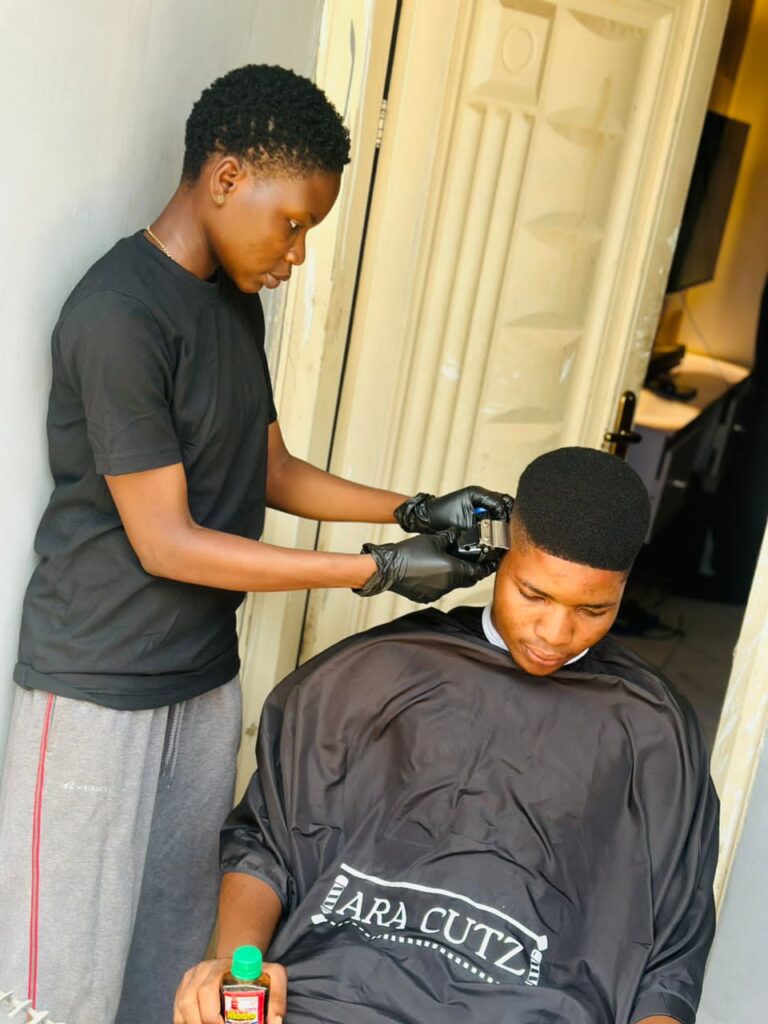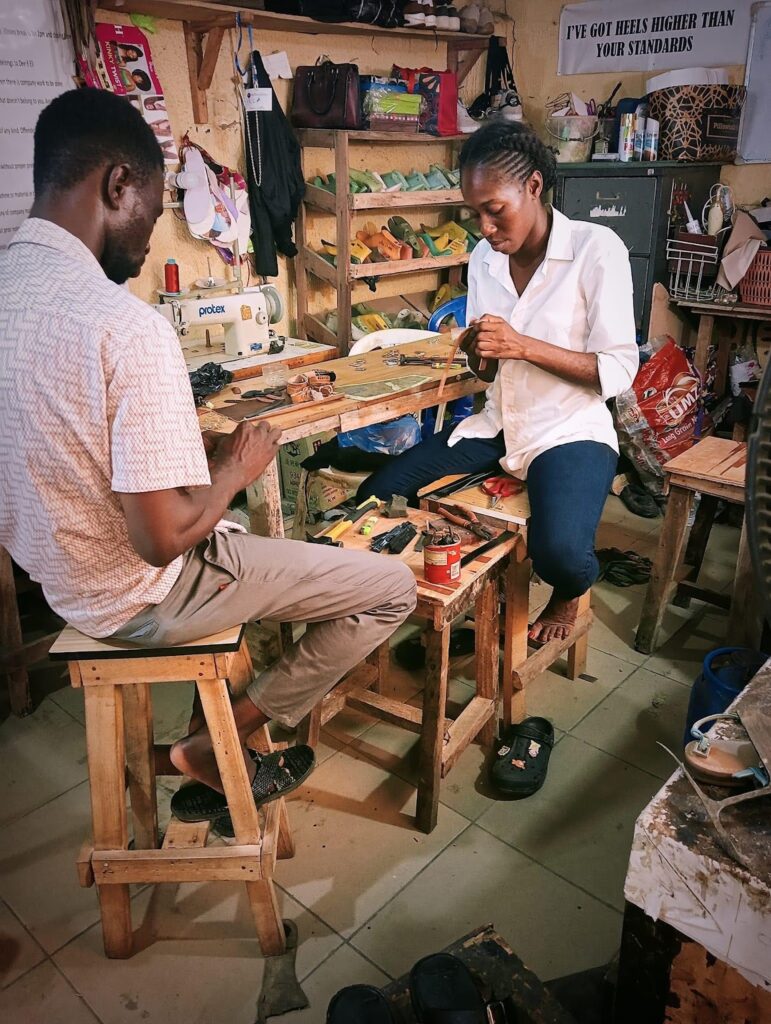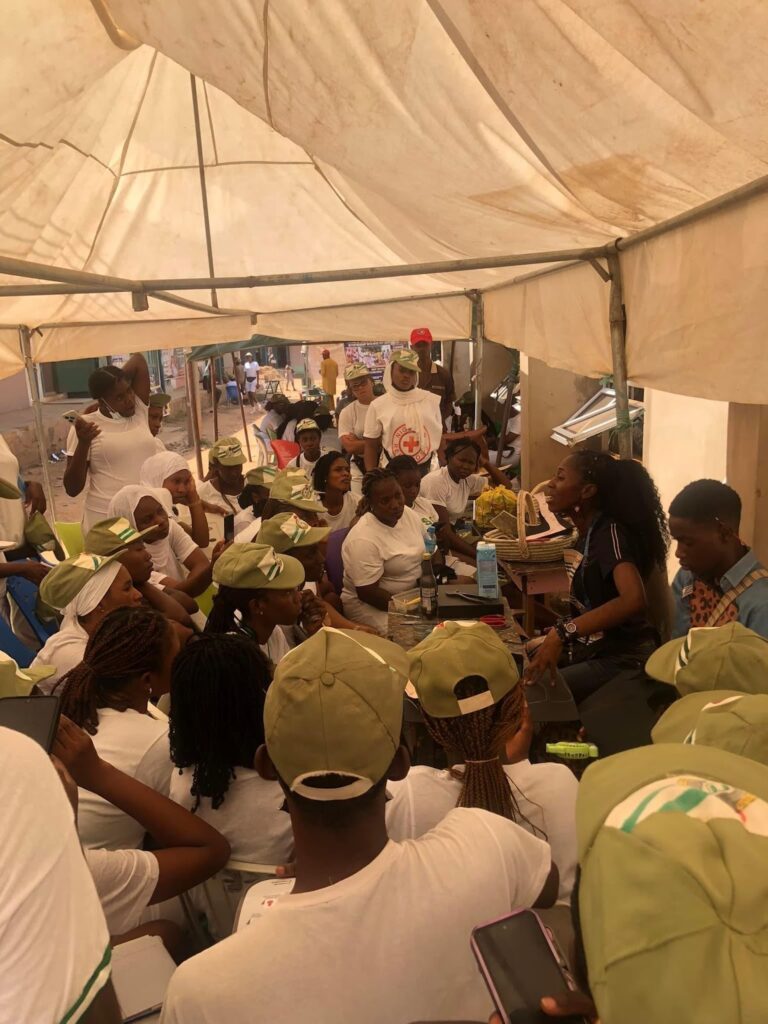Nigerian Women Defy Norms, Embrace Male-Dominated Jobs for Survival
Economic hardship is increasingly proving a strong breaker of gender roles in Nigeria.
While growing up, Anabel Eugene dreamed of becoming a civil engineer or a military personnel. However, due to economic hardship, things went differently than planned after she graduated from secondary school.
Four years later, she ventured into tiling, which involves covering floors or walls using geometric shapes called tiles.
The 29-year-old woman, who hails from Sardauna Local Government Area of Taraba State in northeastern Nigeria, told HumAngle that she started the job in 2016 to assist her single mother in caring for her siblings.
For her, the tiling job is a combination of passion and survival.
“Life in Nigeria is hard, and not doing anything makes it even harder. So, as a young girl trying to survive on her own in the hard economy, I had to do something unusual and legal to maintain my dignity and integrity,” she said.
“When I started, I also realised that I was keeping my late father’s legacy because he was a bricklayer before he passed on,” Anabel narrated. “I learnt from a Togolese who selflessly trained me like he was training a man. Later, I frequently searched YouTube and other platforms for videos that could improve my knowledge as new trends and designs come up every day.”
Before becoming a full-time tiller, Anabel said, she was already in the tailoring profession.
“I can say that I am a multi-talented person, but I was considering another profitable handwork,” she said.
Anabel decided to give up tailoring because she needed more income, which the tiling job guaranteed. She also found fulfilment in it amid the desire to carry on with her late father’s legacy.
Annabel is married and uses her income to support her family and fend for their sick child. Her widowed mother also relies on her for financial support.
“The Grace of God, passion, determination and the constant reminder of where I’m coming from, where I need to be, and the things I have to achieve in life inspire me to work harder. Also, my mom and my son’s health condition has been my greatest motivation,” she said.
Like Anabel, many other Nigerian women are taking over male-dominated jobs to survive the economic downturn.
In her case, Akodu Rukayat, a final-year student at the University of Ilorin (UNILORIN), Kwara State, in North-central Nigeria, works as a barber at the tertiary institution because she needs the stipend to provide her with basic campus amenities.
In an interview with HumAngle, Rukayat revealed that it was a requirement for everyone in her household to learn vocational skills.

She chose the profession “because it’s not common for women. My other sisters were doing hairdressing and tailoring, so I felt it would be too boring for all of us to be doing the same thing,” she said.
Even as a student, Rukayat finds time to practice different barbing styles with her hostel mates and has improved her skills by watching YouTube videos and Instagram updates.
Rukayat explained that her customers are her biggest motivation because some of them do not judge her by her gender. Some of these customers praise her and go as far as recommending her to other people.
She believes that women who venture into male-dominated fields have a greater advantage and higher chances of making it big if they stand out.
Rukayat said barbing had provided her with the financial support she needed in school, and even after graduation, she would keep using her skills until she eventually got a white-collar job.
“You might have problems getting accepted at first, but just do it because big opportunities will come in the future,” she said.
Another woman defying career norms is Enuoyibo Daniella. She works as a cobbler in Abuja, Nigeria’s capital city, doing everything she can to make ends meet. As a creative, Daniella said she noticed less creativity in the leather sector, so she decided to pursue a career in shoemaking. She doesn’t just mend shoes; she designs and produces them with leather and then sells them in her shop.
However, she expressed her dissatisfaction with the cost-of-living crisis in Nigeria, saying that inflation has significantly affected the costs of goods and that businesses are becoming difficult to run.

Of doubt, stigmatisation and security risk
Meanwhile, the women said they are faced with stigmatisation because their abilities are often undermined. They receive demeaning comments and sometimes beg clients repeatedly to secure jobs.
Anabel told HumAngle that some male colleagues who feel challenged by her work often discouraged her. She has also encountered several clients who doubted her ability to deliver, so she works extra hard to prove them wrong. But she sometimes doesn’t get a chance and ends up losing her job because of gender discrimination.
Daniella also said many still doubt her ability to work on their shoes diligently.
“When I started shoemaking, I used to get a lot of negative comments from men and even women,” she said. “Some usually leave the moment they walk into my workshop and realise I am a woman.”
But she’s never tired of making efforts to improve her craft. Like the rest, she also learns from YouTube and other people who are better than her.
“I learn from anyone and everywhere. Practice makes perfect, so I just keep trying new things while being creative,” Daniella explained.
Anabel added that her tiling job also has security challenges, especially because she sometimes sleeps on-site for a week or more.
“I have faced challenges such as insecurity because sometimes I work in a site with only men, and as the only lady, some of the men would want to take advantage of me, but I have trained myself to be very strong both physically and emotionally to be able to deal with such situations,” she said. “I remind myself daily of where I’m coming from and where I need to be, which helps me stay focused.”
According to Anabel, she has been lucky so far since she hasn’t experienced any form of sexual harassment. However, she explained that people sometimes make comments which make her feel embarrassed about her job.
She gave instances of how her male colleagues berated her for being a tiler instead of doing ‘feminine’ jobs.
Speaking of her challenges at work, Rukayat said some customers do not allow her to cut their hair because she’s a woman.
“They say that I might spoil it, and some tell me that girls don’t touch their heads,” she said.
A 2021 research by the Nigerian Labour Congress and Solidarity Centre on Gender-Based Violence in Nigeria’s labour market asserts that women face various forms of gender-based violence at work. It could be in the form of economic or financial abuse, coercion, sexual harassment, bullying, and intimidation, among others.
Apart from the challenges they faced in terms of their gender, they also battled other economic challenges. For instance, Daniella recalls crying constantly when she started working as a shoemaker because she didn’t have a working space.

“Someone gave me a container, but there was no hangover, so when it rains, it pours into my shop,” she said. “I even run the current workshop on generators because of epileptic power supply. This is not a system where the government works for us.”
Despite the low motivation they receive from the public, the women are using their crafts to improve themselves and their livelihood.
While Anabel has a degree in History and Diplomatic Studies from Taraba State University, Rukayat is about to graduate from UNILORIN, and Daniella is training many young graduates to make shoes.
According to McKinsey Global Institute, a global research firm, gender equality at work will occur when issues like education level, financial and digital inclusion, legal protection, and unpaid care work are addressed.
“Both advanced and developing countries stand to gain if women participate in the labour force at the same rate as men, work the same number of hours as men, and are employed at the same levels as men across sectors,” the firm added.
Support Our Journalism
There are millions of ordinary people affected by conflict in Africa whose stories are missing in the mainstream media. HumAngle is determined to tell those challenging and under-reported stories, hoping that the people impacted by these conflicts will find the safety and security they deserve.
To ensure that we continue to provide public service coverage, we have a small favour to ask you. We want you to be part of our journalistic endeavour by contributing a token to us.
Your donation will further promote a robust, free, and independent media.
Donate HereStay Closer To The Stories That Matter





